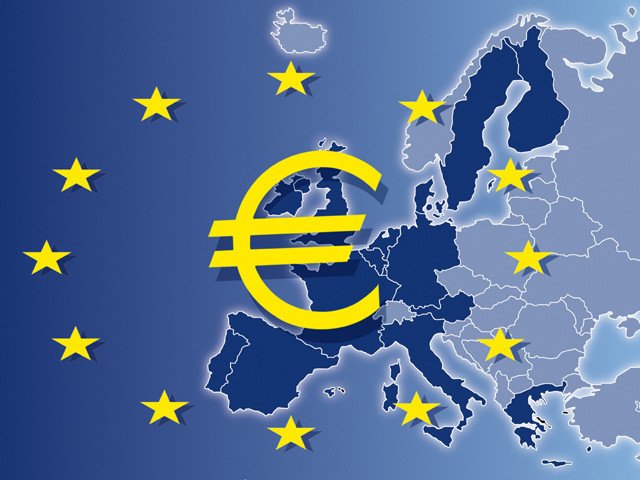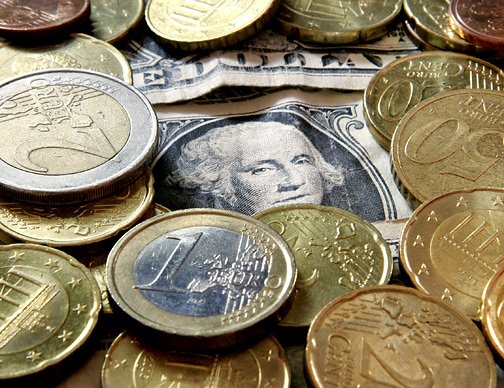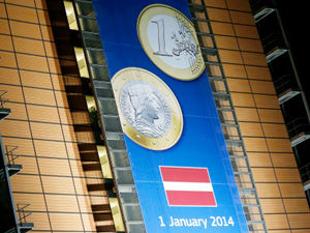Deflation has deepened across the 19 countries that use the euro currency.
In January, prices in the eurozone were 0.6% down on their levels a year ago.
The figure shows the eurozone heading deeper into deflationary territory from December, when prices were 0.2% down on the year before.
A large contributor to falling prices is the cost of energy, with oil prices down almost 60% on the middle of last year.
Energy prices plunged 8.9% in January.
If food and energy are stripped out of the calculations, eurozone prices were still rising at an inflation rate of 0.5%, down from 0.7% the month before.
The eurozone has only once before experienced deflation at these levels, in July 2009, as the region first went into recession following the financial crisis.
Last week the European Central Bank (ECB) launched a program aimed at pushing prices back up – known as quantitative easing – through which it injected around 1 trillion euros into the economy.
Christian Schulz, senior economist at Berenberg Bank said the latest figures showed that “the ECB was … more than justified in taking aggressive action earlier this month.
“The multi-stimulus of cheap oil, a weak euro and aggressive monetary easing is now stabilizing expectations and will help the ECB reach its price stability target over time.”
There was better news on eurozone unemployment, which fell to 11.4% in December, down from 11.5% in November.
Within that figure there are huge differences between jobless levels in different countries.
Germany has a 4.8% unemployment rate. But 25.8% of Greece’s labor force is out of work and Spain’s jobless rate is 23.7%.
The euro was slightly higher after the news, rising 0.35% against the dollar to $1.1358, and sending the pound down 0.25% to €1.3276.
[youtube hHKlAlnfMQE 650]
The euro has reached a nine-year low against the US dollar as investors predicted the European Central Bank (ECB) may act to stimulate the economy.
The European currency fell by 1.2% against the dollar to $1.1864, marking its weakest level since March 2006, before recovering slightly to $1.19370.
The drop follows ECB president Mario Draghi’s comments indicating the bank could soon start quantitative easing (QE).
Greek political turmoil also weighed on the currency.
Although the ECB has already cut interest rates to a record low level, and also bought some bonds issued by private companies, a full-scale program of QE has not yet been launched.
On January 2, Mario Draghi hinted in a newspaper interview that the ECB might soon start a policy of QE by buying government bonds, thus copying its counterparts in the UK and US.
The purpose would be to inject cash into the banking system, stimulate the economy and push prices higher.
In an interview with German newspaper Handelsblatt, Mario Draghi said: “We are making technical preparations to alter the size, pace and composition of our measures in early 2015.”
Political turmoil in Greece also weighed on the euro, with fears that the general election on January 25, could see the anti-austerity, left-wing Syriza party take control of the country.
The possibility has sparked fears about whether Greece will stick to the terms of its international bailout and stay in the eurozone.
On January 3, German magazine Der Spiegel magazine said Germany believes the eurozone would be able to cope with a Greek “exit” from the euro, if the Syriza party wins the Greek election.
Reacting to the Der Speigel report, a spokesman for German Chancellor Angela Merkel said there was no change in German policy and the government expects Greece to fulfill its obligations under the EU, ECB and IMF bailout.
France’s President Francois Hollande also commented, saying it was now “up to the Greeks” to decide whether to remain a part of the single currency.
“Europe cannot continue to be identified by austerity,” Francois Hollande added, suggesting that the eurozone needs to focus more on growth than reducing its deficit.
Analysts said the euro was likely to remain volatile for the next few weeks.
Latvia has joined the eurozone as of 1st of January 2014, becoming the 18th member of the group of EU states which uses the euro as its currency.
The former Soviet republic on the Baltic Sea recently emerged from the financial crisis to become the EU’s fastest-growing economy.
Correspondents report much skepticism in the country after recent bailouts for existing eurozone members.
But there is also hope that the euro will reduce dependency on Russia.
EU commissioner Olli Rehn said joining the eurozone marked “the completion of Latvia’s journey back to the political and economic heart of our continent, and that is something for all of us to celebrate”.
The government and most business owners also welcomed the single currency, saying it would improve Latvia’s credit rating and attract foreign investors.
However, some opinion polls suggested almost 60% of the population did not want the new currency.

Latvia became the 18th member of the group of EU states which uses the euro as its currency
“It’s a big opportunity for Latvia’s economic development,” PM Valdis Dombrovskis said after symbolically withdrawing a 10-euro note as fireworks led celebrations in the capital Riga after midnight.
The governor of the Latvian central bank, Ilmars Rimsevics, said: “Euro brings stability and certainty, definitely attracting investment, so new jobs, new taxes and so on. So being in the second largest currency union I think will definitely mean more popularity.”
One of those reluctant to give up Latvia’s own currency, the lats, was Zaneta Smirnova.
“I am against the euro,” she told AFP news agency.
“This isn’t a happy day. The lats is ours, the euro isn’t – we should have kept the lats.”
Leonora Timofeyeva, who earns the minimum wage of 200 lats (284 euros; $392) per month tending graves in a village north of the capital Riga, said: “Everyone expects prices will go up in January.”
But pensioner Maiga Majore believed euro adoption could “only be a good thing”.
“To be part of a huge European market is important,” she told AFP.
“All this talk about price rises is just alarmist.”
Alf Vanags, director of the Baltic International Centre for Economic Policy Studies, told Bloomberg news agency he personally did not like giving up the familiar lats but it was an “entirely irrational sentiment”.
Euro adoption was good for Latvia “on balance”, he argued, since it provided a mutual insurance policy that countries could draw on when they got into trouble.
Latvia, with its large ethnic Russian minority, is often seen as having closer economic ties to Russia than its fellow Baltic states Lithuania and Estonia. Russia remains an important export market while its banking system attracts substantial deposits from clients in other ex-Soviet states.
[youtube 1lENELCWjrA 650]



